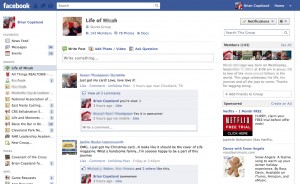 A Facebook friend recently asked me if she could message all her friends via Facebook at the same time.  The answer is no, according to Facebook, you can message 20 friends otherwise you should be using Facebook groups.  While it’s a quickly read statement in the questions and answers area, there truly is value in Facebook groups when used correctly.  The question for every designer is, how should you use Facebook groups and should they be “open,†“closed†or secret.
A Facebook friend recently asked me if she could message all her friends via Facebook at the same time.  The answer is no, according to Facebook, you can message 20 friends otherwise you should be using Facebook groups.  While it’s a quickly read statement in the questions and answers area, there truly is value in Facebook groups when used correctly.  The question for every designer is, how should you use Facebook groups and should they be “open,†“closed†or secret.
I’m a Facebook Groups addict. I start a group for almost any idea I have.  I have found it an amazing way to bring people together and create a strong, niche-oriented community or to create a private, confidential sharing space.
In the Google group world, I’ve been a member of so many of these types of groups.  They always seemed not only cumbersome, but also lacking value.  I wanted to create my own group in the business technology subject area, but I didn’t want others to know it existed.  I created my first Facebook group as a “secret†group for several reasons.
1.    I didn’t want a ton of people in the group.
2. Â Â Â I wanted the group to feel like they were a part of something special.
3. Â Â Â I needed to be able to remove people who were not contributing to the greater good of the group.
4.    I didn’t want the content to show up in other people’s feeds outside of the secret group.
I also use a secret group for my son’s scrapbooking.  In September 2011, I adopted the most amazing little baby.  On the day of his birth, I wanted to share the news with everyone close to me.  The problem is, I have over 150 people who are extremely significant in my life, whether they are family, friends, co-workers or church friends.  I knew when my son was born, there was no way I could call or text message all of them.  I also knew that all the news I would be releasing the day of his birth would be a burden if I emailed everyone.
The answer at 4:00 a.m. the day of his birth was a secret Facebook group.  I started adding people before the sunrise and by the end of the hour, I had 187 people in the group ready to receive the day’s news. The difference from email here, however, is this became a permission-based model.  The members could go in their time frame to see what was happening throughout the birthing process.
One friend from Ohio called me the next week and said she and her husband had both taken off work all day to watch the Facebook group once they woke up that morning and saw they had been added. Â She also admitted it made her fall in love with social media for the first time, feeling so connected to the instant news.
It was great for me because I felt connected with my close network with a photo, update or video in an instant.  That group eventually grew into the ongoing virtual scrapbook for my son that is also a secret group.  Call me crazy, but I just don’t want my entire child’s life on the web for the world to see.  I do, however, want to share his life in a safe place with those I love and trust.  I tend to gravitate to the secret group, but remember there are two more types of groups on Facebook you can create.
  My second favorite group is the “closed†group.  I know, it sounds so snobby or elitist, however the closed group can help you protect the rules and parameters the success of the on-line community.
 My second favorite group is the “closed†group.  I know, it sounds so snobby or elitist, however the closed group can help you protect the rules and parameters the success of the on-line community.
A recently started a parenting closed group.  I wanted to create a space that was safe for parents to post information, photos and ask questions without worrying about stalkers or lurkers.  In that group, I require everyone to prove they are a parent prior to being allowed into the group.  In the group’s information, I spell out the safety and checks that go into place to make the group a safe spot for parents and the children.
The other closed group is a professional group for real estate agents only. Â A huge gap existed in my immediate area for agents from a cross section of geographic areas to network and not be sold to constantly. When someone requests to join I check to make sure they are in the geographic area and they truly are a real estate agent. Â This space has become a wonderful area for more than 700 agents to get answers, promote events and vent frustration. Â Remember, the closed group can be found in searching and all the group members can be seen by the outside world, however only group members can see the posts.
The last type of group is the “open group.† Anyone can see the group and all the contents without being a member. To contribute to the group, you must ask to join and then be approved by an administrator.  I personally don’t administer any open groups; however, I’m a member of several.  The open group is great for mass trade associations or places where conversation flows freely with few expectations.  If you want to bring a lot of people together and you want them to easily find you, this is a great option.
Now, remember in groups, there are some tips, etiquette and aspects you need to remember.
1.    Don’t just start adding people to a group for no reason.  This is considered poor social form.  If you know someone truly has an interest, then add them. If you’re selling a product or creating a network market, adding them to a group is a surefire way to be unfriended in the real and on-line world.
2. Â Â Â Be an active member. Â Post photos, statements and videos on a consistent basis.
3.    Don’t be too active.  Yeah, I know, I just told you to be active, but oversharing can often make people tune you out. Make sure your content is important and selfless.
4.    Interact with others.  If someone posts something you like, click the “like†button.  Better yet, place a comment in the stream below the post.  It simply makes people feel good to know people are reading and liking their content.
5.    Facebook groups don’t keep everything chronologically.  The most recently commented upon post will show at the top. The other day, a friend in a group got his feelings hurt because he thought someone had erased his post when it fell down in the feed.  Remember, your statement will stay up top as long as people are commenting on it.
6.    If you administer a secret or closed group, it’s your job to be involved.  Keep people talking.  Remove rude people and posts that don’t adhere to the guidelines you have in place.


